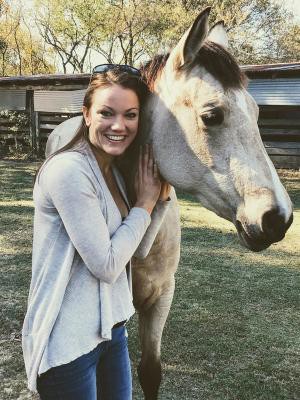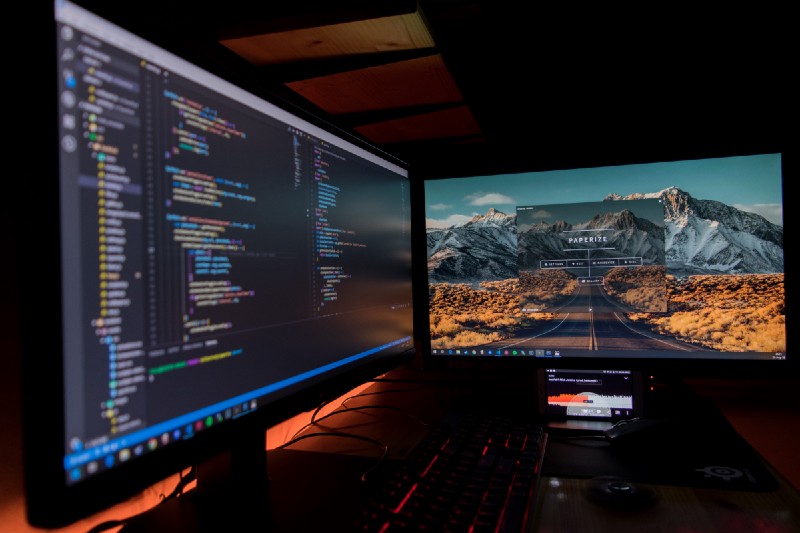This post was originally published on Coder-Coder.com.
Hey everyone! I’m super excited to introduce you all to Mandy, a self-taught game developer. She changed careers, taught herself how to build games, and currently runs a game dev shop with her husband.
If you’re looking for a good story on someone who reinvented themselves and is their own boss, look no further! ?

Could you give us a quick introduction into who you are and what you do currently?
I’m Mandy, a self-taught programmer and the Co-Founder of Black Hive Media, an indie game studio my husband and I own and run in Austin, Texas.
I started learning to code when the iOS market was still in its infancy and we founded our company in 2009 centering it around iOS apps and games. Of course, soon after that Android gave iOS a run for their money, so we quickly adapted to being a mobile game/app company.
I read on your blog that you actually switched to game development after working in the finance industry. What led you to make the decision to change careers?
I went to a small-town high school, that didn’t really have a lot of interesting electives but I did enjoy the accounting classes that I took, so that prompted me to study finance in college.
While I was in college, I was working part-time at a Credit Union which I took very seriously and eventually I dropped out of college and moved up the ranks there turning it into a full-time career.
Years into my career, I started hating my job. It wasn’t fulfilling, the inner office politics were ridiculous, and it felt so mundane like I was living the movie Office Space.
My husband, however, loved his job! He worked as an artist in the game industry and seeing how unhappy I was, he encouraged me to try out programming so that maybe we could make games together.
I took his suggestion very seriously and dove in!
How did you go about learning programming? And about how long did it take you until you could work professionally?
With the iOS App Store booming the year I decided to learn to code, I jumped into Objective-C with Xcode. I had a full-time job, so I would spend nights and weekends reading through digital books, playing with sample projects and scrolling through other developer’s source code.
A few months after diving into Objective-C and iOS development, we published a simple comic book app, Chibi Chaingun. Figuring out how strings works, learning the difference between a global and local variable, and most importantly, understanding provisioning for the App Store was a major confidence booster!
From there I had the motivation to learn more. I figured out buttons and arrays to make our first game, then went on to learn how to integrate other APIs and SDKs into our games, and then eventually learned how to use a few different game engines and different programming languages.
The whole process, from writing my first ‘Hello World’ to taking on my first contract was about 2 years of extremely hard work, spending every spare moment teaching myself through reverse engineering any sample project I could get my hands on.
It has been well worth all my efforts, and I have never looked back!
You and your husband own a game dev shop, Black Hive Media. Do you mind talking a bit about the company, and what you currently have in development?
We started Black Hive in 2009 as an iOS game company, but over the years we’ve been able to adapt to new technologies and platforms. We’ve both worked for a few different tech/game companies in the years since I changed careers, but Black Hive was always a part-time project for both of us.
However, in 2015 we quit our day jobs and made it our primary focus. We released a multi-platform mobile game, Count Crunch’s Candy Curse, a Halloween game that we made in 3 months the year we went full Indie.
More recently, we’ve been focused on our sci-fi Metroidvania, Kova, that we’ll be releasing on PC and consoles next year!
How has working from home been for you and your husband, especially managing a remote team? Do you have any tips on working remotely?
We work 80% of the time remote from our home, but the other 20% we have a tiny office in-town where we meet up with the team for a few hours, twice a week.
Being able to work remotely is mainly about self-motivation and focus. I find it helps to have a tidy workspace and minimal distractions. The best tip I can give about working remotely is to stay on a normal schedule, and we have daily stand-ups with our team every day (in the office or at home) at the same time.
It helps us stay on task and give us a sense of structure.
Long-term, what are your goals as a programmer, and as a human? ?
When I grow up, I want to be the female version of Tim Shaffer, with a well-funded indie game company like Double Fine, that puts out exciting and unique titles. ?
Realistically, I’d like to continue to have a small indie studio that allows us to have a decent quality of life, with a team that continues to excel, making the games that we want to make. I love learning new tech, so I really look forward to exploring VR as our next platform and I might eventually check out the Unreal engine.
Any gear or tools (hardware or software) that you can’t do without?
The biggest software tools that drive our games right now are Trello, OneNote and Unity.
Trello keeps our tasks organized and we use it daily. If someone needs a new asset or finds a bug in code, it immediately goes into Trello. We go through it bi-weekly to prioritize tickets and clean up completed items.
OneNote encompasses our entire game design document for Kova. We have it organized based on every category in the game, from storyline to dialogue, missions to characters, down to the tiniest details like what kind of technology exists in the planets, in-game.
As for Unity, that is the one tool that literally drives our game. We’ve been using the Unity game engine for a few years now and it is the most capable of all the engines we’ve developed with. It allows our artist to have full control of the environments and gives us access to a whole gambit of 2d tools.
The one piece of hardware that I recently fell in love with is my Surface Book (first gen, i7). It has become an invaluable tool for both PC/Console development and mobile development. It runs the software I need to deploy to our dev kits, as well as my dev tool of choice, Unity.
The biggest win for me though is the touchscreen for mobile development. I can test our mobile games on this with all the right touch events, without having to wait 20 minutes for it to deploy to a device. It’s been a major time saver!
Do you have any words of wisdom for people who are hoping to change careers by learning programming?
If you have the continued passion and dedication, then you can do it, just as I did. I never wrote a line of code in my life before I started learning how to program when I was 23 years old.
I stuck with it, even when I hit a speed bump for days, and it has paid off in a quality of life that I didn’t know existed for someone like me. My biggest driver was the thought of making games, at home with my husband, and that’s exactly where I’ve landed.
So find your motivation and remember it every time you hit a wall and most importantly, do it because you love it, not because you hear of all the well-paid industry veterans who retired early.
Anything else you’d like to talk about, feel free to if you so desire!
Just my shameless plug ? Sign up for our beta if you’re into playing games! Follow me on IG and my husband on our company page!
www.blackhivemedia.com
www.shewhocodes.org
Twitter:
@blackhivemedia
@she_who_codes
Facebook:
Black Hive Media
She Who Codes
Instagram:
@blackHiveStudio
@she_who_codes
Want more?
? Read more tutorials on my blog, coder-coder.com.
? Sign up here to get emails about new articles.
? Join 25,000+ others — Follow @thecodercoder on Instagram.
? Check out coding tutorials on my YouTube channel.
